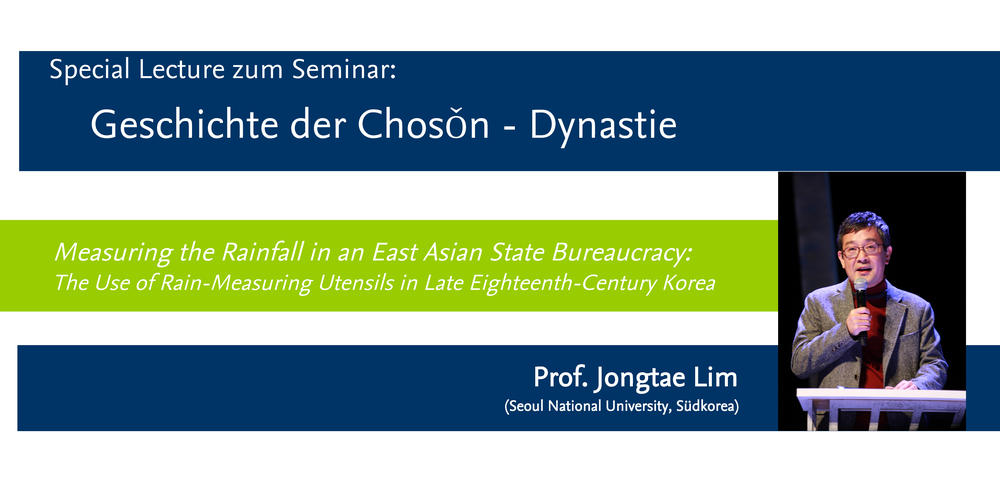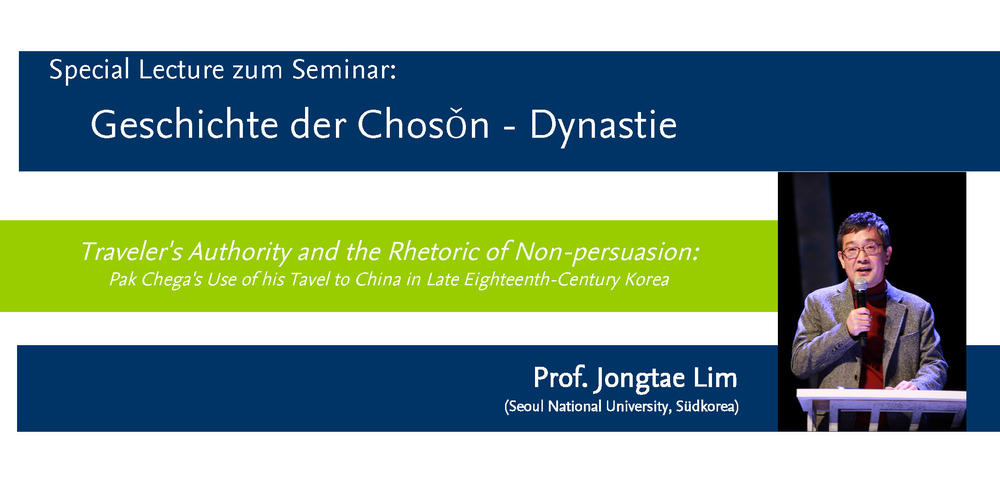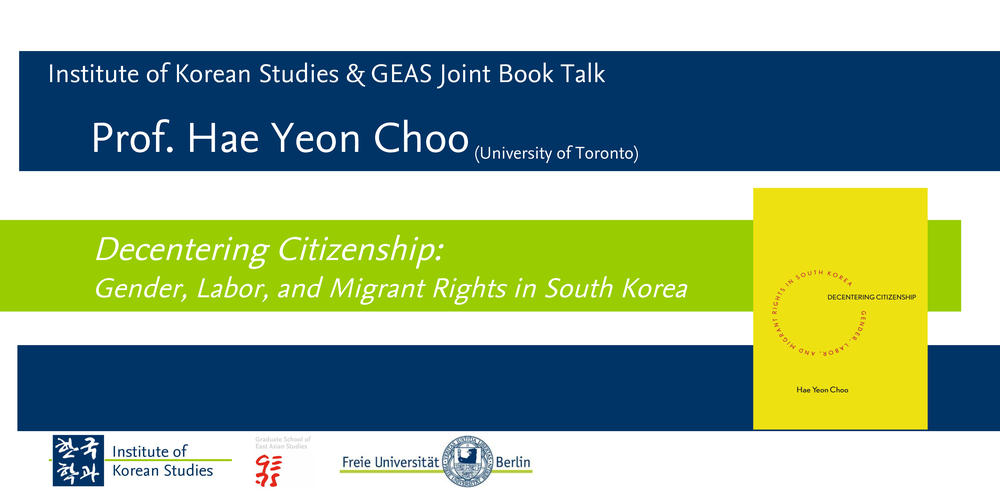Further Special Events
(30.05.2017) Yeojin LEE [Gastautorin]
대학로에서 이뤄지는 사회극 - Die sozialkritische Theaterszene im Seouler Taehang-no-Viertel
Zeit & Ort30.05.2017, 14:00 - 16:00 Uhr
Freie Universität Berlin
Holzlaube, R. 1.2051
Fabeckstr. 23-25
14195 Berlin
(06.06.2017) Yeojin LEE [Gastautorin]
<토일릿 피플> (Toilet People)
In der zweiten Special Lecture unserer ARKO-Gastautorin Yeojin Lee wird sie ihr Stück <토일릿 피플> (Toilet People) vorstellen. Darin geht es um das Leben nordkoreanischer Flüchtlinge in Südkorea, wobei der Fokus auf den Problemen der jungen Leute liegt. Yeojin Lee hat das Stück 2015 geschrieben und jetzt für eine Neuinszenierung überarbeitet, die Ende Juni/Anfang Juli 2017 in der Sogang University in Seoul aufgeführt werden soll.
Zeit & Ort06.06.2017, 10:00 - 12:00 Uhr
Freie Universität Berlin
Silberlaube, J 30/109
Habelschwerdter Allee 45
14195 Berlin
(06.06.2017) Kwanseung SON
"Medien und News Südkoreas im Wandel"
Special Lecture im Rahmen der Lehrveranstaltung – Lektüre koreanischer Online-News –
Kwanseung Son, ehemaliger Berlin-Korrespondent des koreanischen Fernsehsenders MBC sowie vormals CEO von IMBC, dem Internet-TV von MBC, und Prof. der Chung-Ang University Seoul, hält eine Special Lecture zum Thema "Medien und News Südkoreas im Wandel". Der Fokus des Vortrags wird auf den Veränderungen in der südkoreanischen Medienwelt in den letzten Jahrzehnten liegen. Eine sicher sehr spannende Insider-Analyse
06.06.2017, 14.00 - 16:00 Uhr
Freie Universität Berlin
Holzlaube, R. 12051
Fabeckstr. 7
14195 Berlin
(12.06.2017) Prof. Jongtae Lim [Seoul National University]
"Measuring the Rainfall in an East Asian State Bureaucracy:The Use of Rain-Measuring Utensils in Late Eighteenth-Century Korea"
Special Lecture im Rahmen der Lehrveranstaltung: Geschichte der Chosǒn-Dynastie
Abstract:
In spite of its high popularity in Korean society as one of the brilliant scientific inventions in Korean history, the Rain-measuring Utensil (ch’ŭgugi 測雨器) is still not an object properly examined by historians of science. While rich documents are yet to be studied, previous research about the uses of this artifact in Chosŏn society has been sharply divided into two opposing positions. According to the majority opinion, the Utensil was an instrument for ‘scientific’ meteorology, providing rainfall data to be processed ‘statistically’ and then to be used for rationalizing the state agricultural policy. A minority of researchers alternatively suggests that the Utensil performed mainly a politico-ritual function, measuring the rainfall as heavenly messages to the throne. The cases of the late 18th century, however, shows that the Utensil played much more complex roles than suggested in both the two positions. While the Utensil symbolized the king’s priestly power in context of the state rituals for rain, it also provided the kings with a means to control local officials by imposing upon them a standard protocol for their rainfall reports of the provinces. How well did then the instrument perform the multiple roles assigned by the king? Cases in late 18th century tell that the instrument did not guarantee the political effect the king expected. The instrument was not a reflection of royal power, this paper argues, but was rather a product of the lack of it.
Professor Jongtae Lim works in the history of science in Korea, focusing particularly on the modern transformation of Korean science from seventeenth to early twentieth century. His research deals with the transmission of European science into the intellectual society of late Chosǒn period and the subsequent interaction between the foreign science and the traditional knowledge of nature. Opposing to the conventional historiography that has emphasized the 'modernizing' influence of Western science on the late Chosǒn sirhak scholarship, Prof. Lims research highlights the efforts of yangban literati to incorporate the foreign science into the indigenous system of knowledge, the efforts that produced a hybrid of the East Asian and European knowledge of nature.
Zeit & Ort:12.06.2017, 18:00 - 20:00 Uhr
Institut für Koreastudien, Seminarraum
Fabeckstr. 7
14195 Berlin
(26.06.2017) Prof. Jongtae LIM [Seoul National University]
Traveler’s Authority and the Rhetoric of Non-persuasion: Pak Chega’s Use of His Travel to China in Late Eighteenth-Century Korea
Special Lecture im Rahmen der Lehrveranstaltung: Geschichte der Chosǒn-Dynastie
Abstract:
After returning from his tributary mission to Qing China in 1788, a young Korean literatus, Pak Chega, drafted a travelogue-cum-reform proposal, titled the Proposal for the Northern Learning. In this, Pak proposed to “civilize” Korea by means of “learning after China,” particularly by adopting its advanced techniques and refined artifacts. This paper takes Pak’s Proposal as an illuminating case to show how intellectuals from cultural peripheries used their journey to the metropolis as a source of authority legitimizing their reformist agenda. A special attention is paid to Pak’s simplistic opposition between the higher cultures of China, on the one hand, and the hopelessly backward cultures of Korea, on the other. The apparent artificiality of Pak’s binary opposition between China and Korea suggests that Pak’s aim was not in persuading the elite audience. Pak rather attempted to construct an exclusive community of the enlightened travelers, only within which his travel experience and reformist vision were properly communicated. This curious rhetoric of non-persuasion reflected Pak’s self-positioning as a privileged traveler, whose exclusive contact to the source of a higher culture put him into an absolute isolation from the rest of society. Pak’s vision of reforming Korea, without persuading the rest of society, necessarily called for the intervention of an enlightened monarch for it to be implemented. In this regard, Pak was not especially different from the modernizers in twentieth-century Korea, who would rely on the developmental state to realize their elitist program of Westernization.
Zeit & Ort:26.06.2017, 18:00 - 20:00 Uhr
Institut für Koreastudien, Seminarraum
Fabeckstr. 7
14195 Berlin
(12.07.2017) Prof. Hae Yeon Choo [University of Toronto]
Decentering Citizenship: Gender, Labor, and Migrant Rights in South Korea
Abstract:
Decentering Citizenship follows three groups of Filipina migrants' struggles to belong in South Korea: factory workers claiming rights as workers, wives of South Korean men claiming rights as mothers, and hostesses at American military clubs who are excluded from claims—unless they claim to be victims of trafficking. Moving beyond laws and policies, Hae Yeon Choo examines how rights are enacted, translated, and challenged in daily life and ultimately interrogates the concept of citizenship. Choo reveals citizenship as a language of social and personal transformation within the pursuit of dignity, security, and mobility. Her vivid ethnography of both migrants and their South Korean advocates illuminates how social inequalities of gender, race, class, and nation operate in defining citizenship. Decentering Citizenship argues that citizenship emerges from negotiations about rights and belonging between South Koreans and migrants. As the promise of equal rights and full membership in a polity erodes in the face of global inequalities, this decentering illuminates important contestation at the margins of citizenship.
Zur Person:
Hae Yeon Choo is Assistant Professor of Sociology and Affiliated Faculty of the Asian Institute and the Women and Gender Studies Institute at the University of Toronto. Her first book, Decentering Citizenship: Gender, Labor, and Migrant Rights in South Korea (Stanford University Press, 2016), reveals citizenship as a language of social and personal transformation within the pursuit of dignity, security, and mobility. Choo’s research centers on gender, transnational migration, and citizenship to examine global social inequality.
Poster Time & Venue12 July 2017, 6 - 8 pm
Institute of Korean Studies
Fabeckstr. 7
14195 Berlin
koreastudien@geschkult.fu-berlin.de




